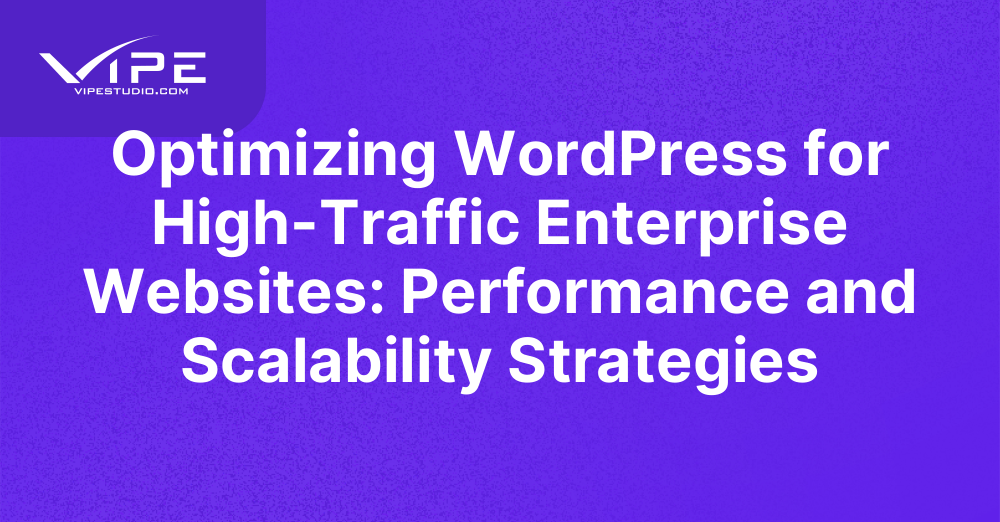11.02.2025
WordPress Development
Optimizing WordPress for High-Traffic Enterprise Websites: Performance and Scalability Strategies
READING TIME: MIN
Table of Content
As enterprises continue to scale their digital operations, ensuring that their WordPress websites can handle high traffic loads is crucial. Performance and scalability directly impact user experience, search rankings, and conversion rates. Without proper optimization, enterprises risk slow load times, server crashes, and lost business opportunities.
In this article, we will explore the best strategies to optimize WordPress for high-traffic enterprise websites, ensuring seamless performance under heavy demand.
Why Performance Optimization Matters for Enterprise WordPress Websites
Enterprise websites receive thousands, if not millions, of visitors daily. Slow website performance can lead to:
- Decreased User Engagement: Studies show that a one-second delay in page load time can reduce conversions by 7%.
- Lower SEO Rankings: Google prioritizes fast-loading websites, meaning slow sites may drop in search engine rankings.
- Higher Server Costs: Inefficient performance can result in increased hosting expenses due to resource overuse.
- Loss of Revenue: Slow checkout processes or page load failures can drive customers away, leading to missed sales opportunities.
Choosing the Right Enterprise-Grade Hosting for Scalability
The foundation of a high-performance WordPress site begins with robust hosting. Enterprises should opt for:
- Managed WordPress Hosting: Platforms like Kinsta, WP Engine, and Cloudways provide optimized performance, automatic updates, and dedicated resources.
- Cloud-Based Solutions: Using scalable cloud hosting, such as AWS, Google Cloud, or DigitalOcean, ensures dynamic resource allocation.
- Content Delivery Network (CDN): CDNs like Cloudflare or StackPath distribute website assets across global servers, reducing latency.
- Load Balancing: Load balancers help distribute traffic across multiple servers to prevent downtime.
Leveraging Caching Mechanisms for Faster Load Times
Caching significantly improves website speed by storing frequently accessed content in temporary storage. Key caching techniques include:
- Page Caching: Tools like WP Rocket, W3 Total Cache, and LiteSpeed Cache store entire pages for quick retrieval.
- Object Caching: Persistent object caching with Redis or Memcached reduces database query load.
- Opcode Caching: PHP opcode caching (e.g., OPcache) speeds up PHP script execution.
- Browser Caching: Enabling browser caching allows returning visitors to load pages faster.
Optimizing WordPress Database for High Performance
A well-maintained database prevents slow queries and performance bottlenecks. Enterprises should:
- Use Indexing: Proper indexing speeds up database queries.
- Remove Unused Data: Deleting spam comments, post revisions, and expired transients improves database efficiency.
- Use an Optimized Database Engine: Switching from MyISAM to InnoDB enhances performance for large databases.
- Schedule Regular Database Cleanups: Plugins like WP-Optimize or manual MySQL queries can help keep the database lean.
Implementing Lazy Loading and Image Optimization
Heavy images and media files slow down website performance. Enterprises should adopt:
- Lazy Loading: Delaying image and video loading until they appear on screen reduces initial load times.
- WebP Image Format: Using WebP instead of traditional formats like JPEG or PNG reduces file sizes without quality loss.
- Image Compression: Plugins like ShortPixel, Smush, and Imagify optimize images automatically.
- CDN for Media Files: Offloading images and videos to a CDN enhances delivery speed.
Reducing HTTP Requests and Minimizing Code Bloat
Enterprise websites often suffer from excessive HTTP requests due to multiple scripts, stylesheets, and plugins. To streamline website performance:
- Minify CSS, JavaScript, and HTML: Tools like Autoptimize reduce file sizes for faster loading.
- Defer JavaScript Execution: Postponing script loading prevents render-blocking issues.
- Combine CSS and JS Files: Merging stylesheets and scripts reduces server requests.
- Eliminate Unused Plugins: Removing unnecessary plugins decreases script execution time.
Implementing Scalable WordPress Architecture
As enterprises grow, their WordPress architecture must support scalability. Best practices include:
- Headless WordPress: Decoupling the front-end using technologies like Next.js or React for faster performance.
- Microservices Approach: Separating functionalities into independent services improves flexibility.
- Horizontal Scaling: Adding multiple server nodes ensures load distribution.
- API-Driven Development: Using REST API or GraphQL reduces direct database queries, improving response times.
How Vipe Studio Helps Enterprises Achieve Optimal WordPress Performance
At Vipe Studio, we specialize in optimizing enterprise WordPress websites for peak performance and scalability. From implementing caching strategies to developing headless solutions, our team ensures that businesses can handle massive traffic loads without compromising speed or reliability.
Looking to enhance your WordPress website’s performance? Contact Vipe Studio today for a tailored optimization strategy.
Conclusion: A Fast and Scalable WordPress Website Drives Business Success
For enterprises, a slow website is not an option. By leveraging high-performance hosting, caching mechanisms, database optimization, and scalable architectures, businesses can ensure a seamless experience for users, improve search rankings, and maximize revenue potential.
Investing in performance optimization today paves the way for a faster, more resilient WordPress website that supports enterprise growth.
More on The Topic
- Navigating WooCommerce Performance: Real-World Strategies
- The Role of AI in WordPress Development Workflows
- Optimizing WordPress for Enterprise: Beyond Basic Caching
- WordPress and Headless Commerce: A Provocative Dilemma
- Decoupled WordPress Architecture: The Future or a Fad?
The content of this website is copyrighted and protected by Creative Commons 4.0.



